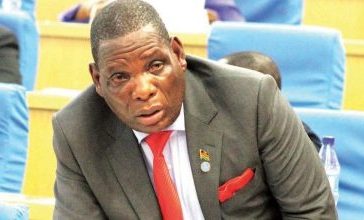Leader of Opposition in Parliament, Kondwani Nankhumwa, has written the State President, Dr. Lazarus Chakwera, expressing concerns over delays in receiving salaries and sitting allowances of Members of Parliament as caused by government payment system hitches.
Over the past week, revelations have emerged that the Integrated Financial Management and Information Systems (Ifmis) is under sabotage by its operators who are said to be advancing sinister political motives of former senior government officials who lost their jobs following the coming in of the new administration.
Malawi started IFMIS implementation in 1995 with the primary aim of controlling government expenditures. Among other objectives, the system was adopted in order to improve and strengthen financial control and management of public funds; to achieve timely and accurate budgeting and financial information across government; to provide standardized integrated financial management reporting system across government, and to provide upgraded and state-of-the-art computerized accounting system.
In 2005, the Government replaced the 1995 version with a new version that ended up presenting loopholes that were exploited by fraud resulting in wanton looting of public money in what became to be known as Cashgate. In 2018, in an effort to eliminate the loopholes, the Government reportedly spent K5 billion procuring a new IFMIS that replaced the 2005 version which was based on Epicor 7.3 software.
2018 installed IFMIS, however, is, apparently, not without it’s attendant downside as circumstances indicate that three years down the line, its effectively sustainable rollout is yet to be witnessed.
On 1st July last year (2020), the 2018 IFMIS went live with misguided impressions by the Accountant General office that the system has “strong security features”.
On 1st July 2020, speaking on the launch of the 2018-installed IFMIS, the then Accountant General, Sungani Mandala, claimed that under the new IFMIS, stealing of public funds would be made almost impossible and that the public sector would begin using electronic funds transfer (EFT) systems in payments, thereby doing away with cheques. However, this never came to pass as the government continued transacting payments with cheques, and theft of public money continued to occur under the DPP administration.
Fast forward, the DPP administration lost power in the 2020 presidential election, and administrators of critical financial and finance-related institutions, which were seen to be advancing DPP interests than Malawi’s interests, were replaced under the new administration. These included the Reserve Bank Governor, the Minister of Finance, the Accountant General, and the Auditor General among others.
However, the operators of IFMIS which were strategically positioned and indoctrinated by the ousted senior government officials have since not been removed. This has, suspiciously, given them room to manipulate and frustrate the system rendering it ineffective.
Given the centrality of the IFMIS to the financial functions of the government, the impact of the sabotage perpetrated by the IFMIS operators has been felt intensely as Government’s Ministries, Departments, and Agencies (MDAs) have spent months without receiving funds for Other Recurrent Transactions (ORTs) which runs the day-to-day affairs.
In August, the impact extended to delayed salaries to all civil servants forcing the President and his Vice to storm the Capital Hill on Thursday last week where he questioned controlling officers in the Department of Human Resource Management and Development (DHRMD).
However, several stakeholders have highlighted that a quick and effective step in addressing this problem lies in removing and replacing the IFMIS operators that are apparently sabotaging the government in service of their fallen masters.
The government is yet to come up with a decision on the same.












